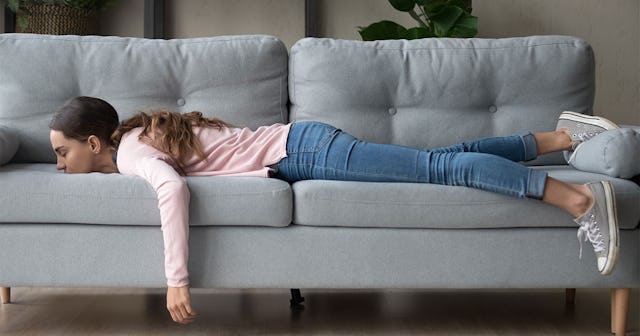The Way We View Downtime Is Making Us Unhappy

We live in a society where productivity seems to be measured by how much time we spend working and how efficiently we can burnout faster than our friends. A lack of time is often seen as a status symbol. Work is no longer a 9-5 gig; we are available any time we are awake and convince ourselves that sending a work email at midnight will reduce our stress and make the next day easier. It often doesn’t. We are in a constant cycle of work, stress, and measuring our self-worth by the money we have and titles we carry.
The pandemic added extra layers of anxiety and created funky work schedules since we are often working around kids and partners; many of us are barely keeping it together. We are craving downtime, alone time, and a much-needed vacation. But when we finally do take time off or carve out leisure time, we struggle to actually enjoy it.
Part of this struggle has to do with the way we look at self-care or downtime. It often starts with guilt and ends in missed opportunities to recharge. A study showed that in 2018, 55% of people who had vacation time didn’t use it all. People need to find what works best for them to unwind, but finding something to take care of our mental and physical health is universally important. It took me a long time to let go of the ‘shoulds’ when I started to make a deliberate effort to do what I needed to take care of myself.
Pausing my work day to work out, get a haircut, see my therapist, or talk to a friend could be seen as unnecessary when compared to the work that I think I should be doing. Yet, because I’m still doing something that in my mind is ‘productive,’ I’m more relaxed and benefit from these moments of self-care. This way of thinking tends to bleed into afternoons I take off or by day three of a week-long vacation so downtime tends to be active.
Listen — I know I need to work on this a bit, but I’m not alone. In a research paper, Anat Keinan and Ran Kivetz found that people tend to build experiential resumes through seeking out “collectable experiences” that help us to see our downtime as something productive vs. something to simply enjoy in the moment. I am someone who — whether good or bad — sees downtime as something that should be seized and made to count.
This can make for great planning fun adventures and does add up to pretty awesome experiences and photo opportunities, but it can also cause stress — that thing I’m trying to escape. In his book, Spending Time: The Most Valuable Resource, economist Daniel Hamermesh says, “Our ability to purchase and enjoy goods and services has risen much more rapidly than the amount of time available for us to enjoy them.”
Americans are offered the least amount of paid time off in the world, so when we do take time off, we want to maximize every minute. The anticipation of the coveted vacation and then the fear of missing out while on said vacation while expecting more from our time off is poisoning the way we value our time. Comparing what we do with our time off to what others post to social media during their vacations doesn’t help either.
But other people — I’m sometimes other people — can’t find enjoyment in downtime at all. Time off is more stressful for some folks than maintaining the daily grind. I have felt this at times too. I like routine and a predictable schedule. I don’t like the reentry into work and the overwhelming number of tasks to get caught up after a break or holiday. But over the last few years I have started to value downtime and see it as a supplement to me reaching my goals and not a distraction from them.
Research shows that the people who see idle or downtime as wasteful even when it doesn’t get in the way of their dreams or goals have increased levels of unhappiness, stress, and anxiety. But what’s the point of work if I can’t find joy in life separate from my employment? How can I be the level of productive I want to be if I feel shitty about the other important parts of my life?
Kienan says that to combat the productivity mindset, we can practice “assuming a broader perspective on life and anticipating your long-term regrets, as it allows people to enjoy the present more.” Practicing mindfulness and staying in the moment enhances our leisure time and strengthens the memory of those good feelings. This, in combination with finding a functional alibi — an acceptable to us excuse to enjoy ourselves — allows us to get that much needed time to rest and relax without feeling bad about it. And if you can’t convince yourself to take full vacation weeks, try to do something each day that is just for you. Because you enjoy it and it brings you happiness. Every moment doesn’t need to carry the weight of importance or purpose.
This is a lot of mental gymnastics to fully enjoy a few hours of Netflix or a long weekend at the beach or in the woods. But through practice and reminding ourselves that we deserve and need downtime we can start valuing all of our time and not just the hours spent working.
This article was originally published on